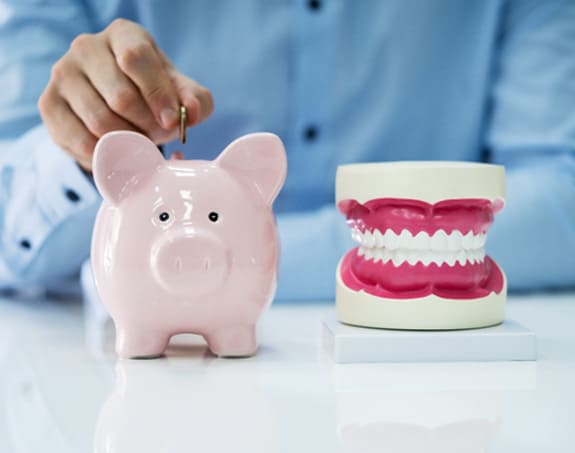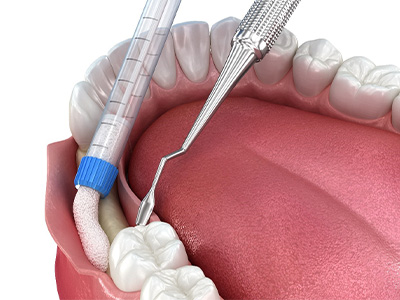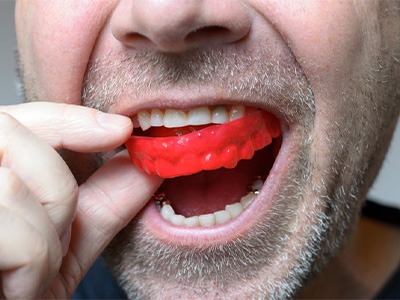Dental Implants – Morgan Hill, CA
Turn Back the Clock on Tooth Loss
Modern dentures and dental bridges certainly look like natural teeth, but they leave much to be desired in terms of how they feel. Dental implants solve this problem; by being firmly embedded in the jawbone, they replicate the entire structure of the lost teeth. With dental implants from our Morgan Hill, CA dentist, you might even forget your teeth were ever missing to begin with! To learn more about dental implants, reach out to our team at Timeless Smiles Morgan Hill today.
Why Choose Timeless Smiles Morgan Hill for Dental Implants?
- Dental Implant Surgery Completed In-House
- Advanced Surgical Guide Technology for Extreme Precision
- Digital Dental Impressions Without the Mess
What Are Dental Implants?

Dental implants are tiny rods that are surgically placed in the jawbone to serve as new tooth roots. Because the implants are made from biocompatible titanium, the jawbone grows attached to them over the course of a few months. After this process, called osseointegration, is complete, we can attach any number of prosthetic teeth on top of the implants.
The 4-Step Dental Implant Process

Instead of running across town to visit a specialist for the surgical step of your treatment, you can experience start-to-finish dental implant care under one roof thanks to Dr. Hong’s extensive training. The details of the process can vary, but the four basic phases outlined below remain the same for each patient.
Initial Dental Implant Consultation

The first and most crucial step of every dental implant procedure is the consultation. During this appointment, Dr. Hong will help determine whether dental implants are right for you by examining X-rays taken of your mouth as well as conducting a thorough checkup of your teeth and gums. She will also discuss your medical and oral health histories with you, as well as any medications you may be taking.
If you’re a good candidate for the procedure, Dr. Hong will create a detailed treatment plan that she’ll walk you through so you know exactly what the process will entail. If you’re interested in moving forward with the treatment, our team can provide you with a detailed cost estimate as well as any relevant information regarding dental insurance coverage and financing.
Dental Implant Placement

Due to Dr. Hong’s extensive additional training through the world-renowned Kois Center in Seattle, as well as her Implant Fellowship training that she completed through the International Congress of Oral Implantologists, she’s able to complete the dental implant surgery herself. As a result, you won’t need to worry about being shuffled around from provider-to-provider throughout your dental implant treatment. You’ll be able to stick with the same, trusted team of experts the entire journey.
Osseointegration, Healing & Abutment Attachment

Once Dr. Hong has completed the dental implant placement surgery, you will undergo a long healing and osseointegration period of between three and six months. During this time, the gum tissue will repair itself and the dental implants will naturally fuse with the jawbone, creating a durable foundation for your restorations to be attached to.
Once osseointegration is complete, Dr. Hong will then attach small, metal connector pieces to the tops of your dental implants, called abutments. This will allow your restoration to clip onto the dental implants.
Securing Your Final Restorations

We work with state-of-the-art dental laboratories to ensure the most aesthetically pleasing, beautiful results. When your final restoration arrives, we’ll call you into the office to make sure it’s a perfect fit and that the shade of the gums and teeth look natural. Then, we’ll attach them to your abutments to complete the process!
Benefits of Dental Implants
Dental implants stand a cut above other tooth replacement choices. Due to their placement method, they have positive effects that dentures and dental bridges can’t match. The result is that they’re so popular that dentists place 500,000 of them yearly. As for the details on these posts’ perks, our office will gladly tell you. Simply read on (or call us) to learn the many benefits of dental implants and how they enhance your life.

Day-to-Day Benefits
Soon after you get dental implants, you’ll notice their everyday upsides. The most common ones are:

- Seamless Results – Because they’re capped with porcelain crowns, dental implants blend seamlessly with your smile. They also never slip or fall out, which helps them seem even more lifelike.
- Easy Oral Care – Compared to other restorations, dental implants are easier to clean. Most patients can just care for them like natural teeth, so brush them twice daily and floss once daily.
- A Confident Mood – Dental implants fill your grin’s gaps, so they should give you a nice confidence boost. You’ll feel more self-assured when you don’t have to worry about spaces in your smile.
- Better Chewing – Once they fuse with your mouth, dental implants restore most of your jaw’s bite force. They’ll thus let you chew tough foods again!
Health Benefits
Besides their everyday benefits, dental implants also have health-related perks. These include:

- A Healthier Mouth – Smile gaps let harmful bacteria grow in your mouth, elevating your risk of tooth decay and gum disease. Luckily, dental implants fill these spaces to protect your oral health.
- Stronger Jaw – Unless it’s treated, tooth loss will make your jaw erode and cause facial collapse. Still, dental implants prevent and even reverse this erosion.
- Tooth Support – Untreated smile gaps tilt your other teeth until they fall out of your mouth. However, dental implants prevent this tilting when they’re placed in time.
- Superior Nutrition – Dental implants expand your dietary choices by letting you chew tough foods (see above). That means you have foods that boost your nutritional health.
Long-term Benefits
Assuming you care for them well, your dental implants will have long-term benefits. The notable ones are:

- High Success – Dental implants tend to succeed in the long run, especially when placed by qualified dentists. Their success rate over ten years exceeds 98%!
- Long Lifespan– A dental implant lasts about 15-20 years on average. Meanwhile, well-maintained ones can have a lifespan of 30+ years.
- Cost-Effectiveness – As dental implants last longer, they save you more and more money. That’s because these posts hardly ever need repair or replacement work. In other words, they don’t involve costly follow-ups like dentures or dental bridges.
Who Dental Implants Can Help

Besides their lifelike results, another reason for the popularity of dental implants is their versatility. Whether you need to replace just one tooth, a few teeth, or an entire row, dental implants can help the majority of healthy adults enjoy a complete smile again. After Dr. Hong verifies your eligibility, she can begin planning one of the following dental implant treatments.
Missing One Tooth

By placing a single implant into the gap and covering it with a crown, there’s no need to modify any healthy tooth structure like there would be to place a dental bridge. This makes an implant the healthier and less invasive choice in the long term.
Missing Multiple Teeth

We may be able to fill gaps throughout the arch by anchoring a partial denture onto a few expertly positioned implants. Several consecutive teeth can be brought back by securing a bridge onto two implant posts, each placed at one end of the empty space. This method preserves your remaining enamel while also being more cost-effective than replacing each tooth with its own implant.
Missing All Teeth

It’s possible to provide enough support for a full denture using just four to eight posts. Implant dentures are much more reliable than traditional prosthetics; they never slip, and you can brush and floss them like regular teeth instead of performing a time-consuming cleaning routine every night.
Learn More About Implant Dentures Learn More About All-On-4
Dental Implants Post-Op Instructions

Many patients worry about what to expect from their recovery after their dental implants have been placed. It’s important to follow Dr. Hong's instructions to help you heal as quickly and efficiently as possible. Continue reading to learn more about what to anticipate after your procedure is completed, and please contact us right away if you experience any unexpected side effects or abnormal pain that aren’t listed below.
What to Do Directly After Dental Implant Surgery

Once your implant is inserted into your jawbone, your mouth must form a blood clot at the site to fully mend. You’ll need to be careful not to damage or dislodge it because doing so can hinder your recovery. Some tips to preserve it include:
- Don’t spit. You might be numb for a while after your surgery and have excess saliva, but forceful spitting can cause you to lose your blood clot. Instead, use a tissue to gently wipe it away or swallow it.
- Avoid straws. The change in pressure exerted when you suck on a straw can dislodge the clot.
- Don’t smoke. Not only can drawing on a vape or cigarette can harm your blood clot, but nicotine restricts blood flow and oxygen levels. Your body cannot deliver essential nutrients to your mouth to keep it healthy and fight infection.
- Keep your hands away. Try not to touch the surgical site with your fingers, tongue, or utensils while eating.
Common Side Effects When Recovering from Dental Implant Placement

As the sedation medication wears off, it’s normal to experience some mild to moderate symptoms. Typically, they reach their peak about three days after your procedure and gradually fade until they’re gone. Some common side effects are:
- Intermittent bleeding. Slight bleeding or oozing is normal. You can slow the flow by placing folded gauze or a clean cloth and biting down gently to create a light but consistent pressure. This can continue for a few days, but please let us know if it worsens or doesn’t stop.
- It’s normal for your gums to feel achy and inflamed for about a week. Applying alternating cold and warm compresses can reduce swelling and provide temporary relief.
- If you’re hurting, it’s usually safe to take over-the-counter pain medications like Tylenol or ibuprofen for a reprieve.
Your Diet After Dental Implant Surgery

Although you won’t have too many dietary restrictions to contend with once you’ve fully healed, for now, it’s a good idea to stick to soft foods that won’t irritate your already tender teeth and gums. You might enjoy:
- Scrambled eggs.
- Mashed potatoes.
- Ice cream.
- Soft pasta.
- Warm (but not hot) soup
Post-Op Health & Oral Hygiene

You don’t want bacteria in your mouth to infect the implant site, so it’s important to keep it clean. However, you don’t want to brush and floss right away after your procedure because it could prevent you from forming the required blood clot. Instead, skip your usual routine for the first 24 hours and rinse gently with warm salt water, instead. This is a natural disinfectant that eradicates germs while loosening and removing any leftover food or larger particles.
It’s usually safe to resume your daily dental hygiene habits the day after your surgery, but please be careful about your restoration.
What to Do After Your New Teeth Are Attached

Thankfully, once the surgery is complete and you recover, the most challenging stage of getting dental implants is behind you. Usually, having your new dental crown, bridge, or dentures attached is a simple and pain-free process. While you might develop some slight gum sensitivity afterward, you should be able to address it with over-the-counter medications. Patients don’t typically experience additional swelling, bleeding, or discomfort during this step. We’ll ensure that everything fits well and works as intended, then you’ll leave with a newly restored smile!
Understanding the Cost of Dental Implants

While dental implants are easy to get excited about, it’s also completely fair to be a little bit trepidations about what they could cost you. While dental implants can be more expensive than other methods of tooth replacement, it’s also the case that you get what you pay for; their resilience and realism meant that what you’re getting is absolutely worth what you pay.
It’s also the case that dental implants don’t necessarily have to break the bank. If you’re interested in budgeting for the treatment effectively, here’s some information you might find useful.
Preliminary Treatments & Dental Implant Surgery

Before thinking about the dental implant itself, there are often preliminary procedures that precede the surgery. If your jaw isn’t sufficiently strong to support the dental implant, it may be necessary to get a bone graft or sinus lift beforehand. Rampant gum disease can also be a problem for the longevity of your implants, so it’s sometimes necessary to perform periodontal therapy before the surgery. Each of these procedures incur their own cost.
Then there’s the price of the dental implant surgery itself. We’re proud to be able to complete this entire procedure in-house, meaning that we will be able to give you an accurate estimate of what you’ll spend on the procedure before we meet you.
The Parts of Your Dental Implant

Of course, a fair amount of the cost of getting dental implants will come from the implants themselves, which in itself can vary depending on a few factors:
- The number of dental implants you’re getting
- The restoration being placed on the implants. Restorations that replace many teeth, like dentures, will be pricier than crowns or bridges that replace only a few.
- The material your dental implant is made from.
- The size of the dental implant.
- The brand of dental implant you’re using.
How Dental Implants Can Save You Money

While it’s true that dental bridges and dentures are the cheaper tooth replacement options, there are some good financial reasons to choose dental implants. The main one is that dental implants routinely last well over 30 years, more than twice as long as what you can expect from other methods of tooth replacement. Dental implants are also often easier to clean than bridges or dentures, meaning that patients typically wind up with fewer health issues to deal with.
Together, these factors mean that you’re likely to spend a lot less on replacements and follow-up treatments with dental implants, saving you cash in the long run.
Does My Dental Insurance Cover Dental Implants?

For a long time, insurance companies considered dental implants to be elective, and were unlikely to cover it. However, that’s rapidly changing. We’ll work with your insurance company in order to ensure that you’re getting the most coverage that you possibly can.
Making Dental Implants Affordable

If you don’t have insurance, that doesn’t necessarily mean that you have to go without dental implants. You may be interested in financing, which can help you front the cost of care and allow you to pay it off later. We work with both CareCredit and Alphaeon Credit, both of which offer low-to-no interest financing terms to patients who qualify.
If you’re interested in this or any other financial option to make dental implants affordable, give us a call and we’ll be happy to talk through them with you.
Maintaining & Caring for Your Dental Implants

Receiving dental implants can put you on the path to enjoying a complete, strong, and healthy smile for a lifetime if you take excellent care of them. Without proper care and hygiene, your dental implants may become infected or fail and need replacement sooner. Here’s a few tips for keeping your new teeth in great shape for as long as possible from the team at Timeless Smiles Morgan Hill.
Make Oral Hygiene a Priority

Unlike traditional restorations like dental bridges and dentures, dental implants only require the same oral hygiene routine as natural teeth. This includes brushing twice, flossing once, and finishing the job by rinsing with antibacterial mouthwash to prevent gum disease and tooth decay. It’s best to use gel toothpaste to prevent your new teeth from being scratched.
Eat a Healthy Diet

While dental implants allow you to eat whatever you like, enjoying a proper diet will give your body what it needs for a lifetime of oral health. Be sure to include plenty of items that are high in protein, calcium, phosphorus, and vitamin D after receiving them to help your gums and jawbone heal.
Break Bad Habits

Certain bad habits can increase the likelihood of your dental implants failing. Smoking is completely horrible for your oral health and can lead to gum disease or hinder the healing process in the soft tissues in your mouth, so it’s best to kick this nasty habit before you receive implants. Using your teeth to open packages or bottles is a great way to chip, crack, fracture, or otherwise break your natural and artificial teeth. This makes expensive repair work or restorative dental treatments necessary, so we recommend investing in a cheap box cutter or a bottle opener instead.
Protect Your Dental Implants

While your dental implants are incredibly strong, they are not indestructible and will break if they endure too much abuse. If you enjoy playing sports or riding a bike, be sure to invest in an athletic mouthguard to cushion your smile in case of falls or blows to the face. If you grind your teeth when you sleep, wearing a nightguard to bed can protect your teeth and implants from damage.
Schedule Regular Dental Checkups

The American Dental Association recommends seeing your dentist at least twice a year for routine exams and cleanings, which is great for us because we love seeing our patients. These appointments allow us to monitor your oral health, advise you on better dental habits, and address any problems in their early stages, and they are crucial if you want your implants to last for as long as possible.
Dental Implant Failure & Salvage

Dental implants are successful in most cases; in fact, they do well 95% of the time! There is no need to be overly worried that something will go wrong with your treatment. However, it must still be admitted that, in rare instances, dental implant failure can occur, possibly due to infection or other sad circumstances. If you ever believe that is happening to you, contact us right away. Dr. Hong and our team will do all we can to diagnose the problem and get your smile’s health back on track as soon as possible.
Learn More About Dental Implant Failure & Salvage
Dental Implant FAQs

Based on what you know, maybe you want dental implants in Morgan Hill. The prosthetics, after all, can restore your smile to working order. Even so, it’s a good idea to learn more about them first. Doing so would confirm if implants are right for you. Fortunately, we at Timeless Smiles can fill in the blanks. To that end, our team has listed some answers to oft-asked questions about dental implants. Feel free to read them and get a sense of our treatment. Otherwise, just call us for other concerns you have.
Are Dental Implants Safe?
When placed by qualified professionals, dental implants are highly safe. They won’t cause any lasting harm to your (remaining) teeth, gums, or any other body part.
For one thing, the implants themselves aren’t dangerous. Their titanium bases aren’t toxic, and their porcelain surfaces don’t irritate mouth tissues. As a result, they shouldn’t result in any severe side effects.
Plus, dentists take proper precautions when placing implants. If a patient has low jawbone density or gum disease, they’ll fix these issues beforehand. (This approach makes implant surgery safer and more successful.) Should you have a medical condition that makes surgery risky, they’ll also discuss it with you at the initial consult.
How Successful Are Dental Implants?
So long as you get them from a skilled dentist, implants work very well. In fact, these prosthetic teeth have a 10-year success rate of over 95%!
Still, implants only succeed when you take care of them properly. Poor maintenance habits often lead them to fail early. As such, you must remember to practice good oral hygiene, routine dental visits, healthy eating, etc. These things will keep your restorations in good shape for a good long time.
On the other hand, you should keep implant location in mind too. Molars, for example, receive more chewing strain than false teeth. Consequently, molar-type implants may be a tad likelier to fail.
How Long Does It Take to Recover from Dental Implant Surgery?
Rather than occurring all at once, implant surgery recovery comes in stages. Each of these periods has a unique timeline for healing.
When it comes to immediate surgery effects, recovering doesn’t take long. You’ll be able to resume normal activities the day after placement. Any wooziness you might’ve felt from anesthetics or sedation will have worn off by that time.
Things like bleeding and swelling, though, take longer to heal. Dentists say such things should stop after three or four days. To ensure that happens, then, avoid strenuous exercise for the first week after surgery.
Lastly, implants only fuse with your jaw about six months after surgery. You thus want to make sure you don’t do anything to disrupt that process.
Will People Be Able to Tell That I Have Dental Implants?
The answer to this question is “unlikely.” Implants are so toothlike that people struggle to tell them apart from natural teeth.
This fact partly stems from implants being customized. Naturally, labs will rely on your dental impressions to design personalized restorations. The result is that the prosthetic will match the surrounding teeth in color, shape, and position.
Implants are also hard to notice due to going into the jaw. Due to that feature, the restorations don’t slip or fall as dentures might. Similarly, they don’t require you to hold your jaw awkwardly to keep them in place.
I Need a Checkup & Cleaning I Need a Dentist for My Child I am Concerned About Bleeding Gums I Have a Cavity or Broken Tooth I am Missing One or More Teeth I Want to Enhance My Smile I Want a Straighter Smile I am Scared of the Dentist I am in Pain & Need Help I Need My Wisdom Teeth Removed I Have Pain in My Jaw View Our Services

